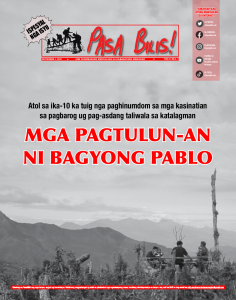by Teri Jose Minggay and the baby in the orokan

It wasn’t gloomy anymore and the strong wind has slowly subsided. It was only drizzling. Eloy stood up and looked around him. The rest of his family also got up. Their surroundings had suddenly become unfamiliar to them. Nothing was standing, neither house nor a tree nor even a person. It was as though the entire place was treated with herbicide, nothing green could be seen, like a wildfire had burned the ground. But all of them were alive, Minggay thought gratefully.
The crowd had gathered as though suddenly awakened from a deep sleep. It didn’t take long for the cries for help to pierce the air. Eloy and the other neighbors ran towards Tiyo Seryo whose feet were pressed under a fallen log. There was a deep wound but they tied a cloth around it immediately. The cries for help then came in quick succession.
An entire family that huddled under their collapsed house. A mother who looked for her lost child. The hypertensive who blacked out. The husband who went back to save his carabao but couldn’t cross the already flooded river. A pregnant woman already feeling contractions earlier than her due date.
“A lot of people need help,” Eloy thought. He looked around and saw his young neighbor Undo.
“Do, find your Ate Minggay, tell her a lot of people are wounded and need help. Hurry up!” Eloy commanded.
Undo came back lugging their youngest as Minggay trailed after him, slinging her medical bag. Trained by the NPA, Minggay is a medic in their barrio and was given some medical supplies. She took an oath to look after the wellness of her fellow residents and provide relief for their illnesses. Part of the job was to likewise take care of the Red fighters who were sick or had been wounded. Minggay swore to do what it took to forward the revolution that would free the oppressed like farmers such as her.
“Inday has taken charge of the house and her little sister,” Minggay said. “Where are the patients?” she added quickly.
Eloy pointed out to the crowd. To be sure, all of them sustained injuries, others only had bruises, but there were some who had worse wounds. Minggay asked those that were not severely injured to fetch water to wash their wounds and clean themselves. Minggay took charge of those who could not stand up and treated them one by one as well as she could. She used her disinfection supplies sparingly because there were no more hagonoy* or guava leaves around. Her antibiotics were reserved for the worst cases.
“Minggay! A child is buried here! He’s not breathing; he must be dead!”
Minggay hurriedly went to where the child was. The neighbor who dug up the child from the mud was cradling the latter, as the child’s mother stood on the side, near fainting from worry and fatigue.
Minggay laid the child on the ground and cleaned his face. It was Potpot, one of the most energetic children in the community. He was not breathing and was turning pale. Minggay put her ear on Potpot’s chest and she could hear a faint beat. She pressed her ear to hear clearly. It was a heartbeat! She hurriedly opened the child’s mouth and fingered out the mud that blocked his airway. She pressed the child’s nose to squeeze out more mud. She took a deep breath and blew air onto the child’s mouth.
She took another deep breath and blew again. Twice. Thrice. Four times. Minggay’s eyes threatened to swell with tears. “Pot, come on. Don’t leave us, Pot,” she pleaded. Another deep breath and another blow. Five. Six times.
On Minggay’s seventh try, the child suddenly coughed and spluttered mud out of his mouth and nose. He coughed continuously but he was breathing now. Minggay turned the child on his side and covered him with a sack she eyed near her. She wasn’t aware that a crowd had gathered around her and when she raised her head, she saw tears of joy and heard cheers for the life, which just a few minutes before had almost been lost, that was unexpectedly saved.
“Kas!” Minggay heard the most cherished greeting in all the world.
Unbeknownst to the residents, Red fighters had been trying to reach the community because they worried about the masses since the typhoon started. Not minding their own terror and troubles in trying to reach the community, the comrades knew for sure that the masses had been more terrorized because of the calamity. And true enough, the masses welcomed the Red army as though the comrades’ presence were a salve for their distress.
“Kas, help us heave this log!”
“Kas, I can’t find my mother!”
“Kas, it’s very cold!”
Minggay knew who she was looking for and when she saw him, she ran towards him and greeted him.
“Kas Bunso, I ran out of betadine! I think Tiyo Seryo has a fracture! Sonya’s having contractions, but she’s still in her eighth month! And Potpot, Kas, he’s now breathing but still unconscious! The children, Kas, what do we do with them?” Minggay rattled breathlessly. She felt like a heavy log had been heaved off of her chest when she saw Bunso, the NPA’s platoon medic.
“Okay, Nay, let’s see them one by one,” said Bunso gently as he embraced Minggay. Bunso called for the other medical officers to hear the rest of Minggay’s updates and take care of the patients.
Around them, other comrades had put up rain curtains and gathered the people under the tents. They placed wooden boards under tree trunks for the masses to sit on. They also took out their dry clothes (which were always dry because comrades pack all their clothes in plastic cellophane before stowing them inside their backpacks) and distributed them among the community. Other comrades started cooking rice from their emergency supply loads, and who knows where they found dry firewood that time!
Calm gradually settled on everyone inside the rain curtains. The children, finally dry and warm, started to bustle as children do and the elders were smiling now. Stories on what every one did when the strong winds pummeled the surroundings started to unravel and the experiences, which only a few hours ago had been some kind of nightmare, suddenly sounded quite comical.
Like Isyot who was almost blown away by the wind but had the wits to hold on tightly to a coconut tree. Or when Aning tried to cram her clothes inside a tattered bag. Or the house that was rocked left and right but never collapsed, though its posts were damaged. The comrades patiently listened to all of these, aware that it was a way for the masses to alleviate their trauma.
“Comrades, help!”
Eloy eyed an orokan box floating in the flooded river. Even in the gush of the river, the cries of a baby could be clearly heard. It was difficult but Eloy waded in the river, tethered to Kas Erning, another Red fighter. The masses and comrades hurriedly linked themselves together to form a human chain until Eloy was able to grab the orokan. It cannot be understated how dangerous the whole affair was, what with the flooded river and all the other things that were drifting in the river, but in the end, the united strength of the masses and the comrades was able to pull everyone back to the safety of the riverbank.
There was really a baby inside the plastic box. Less than a year old, Kas Bunso thought. The baby was red-faced from crying, perhaps due to coldness and hunger, innocent of what had transpired around it. Minggay was already holding a dry cloth. She took the baby and wondered to whom it belonged to. Under the rain curtain, the masses silently formed a circle around the child.
“Next time, Kas Erning, please don’t grab me by my waist because I’m ticklish there!” Eloy suddenly bursted out, breaking the serene silence. And a loud, collective laughter erupted from the masses who successfully struggled together against the strongest typhoon in their history.
Outside, the rain had already subsided into a light drizzle and the warmth of the sun finally peaked through.
* Orokan is a plastic-made chest usually used for household storage
* Hagonoy – herbal medicine used to disinfect wounds
____
First published on Pasa Bilis! July 2013 issue
(Pasa Bilis! Special Issue, December 4, 2022)



